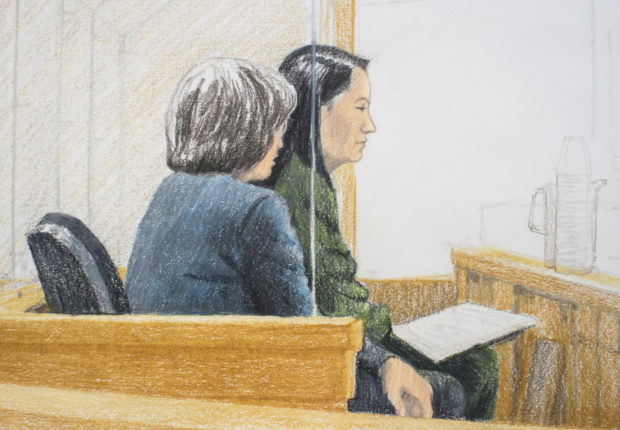Canada’s detention of Huawei exec ‘vile in nature,’ China says

In this courtroom sketch, Meng Wanzhou, right, the chief financial officer of Huawei Technologies, sits beside a translator during a bail hearing at British Columbia Supreme Court in Vancouver, on Friday, Dec. 7, 2018. Meng faces extradition to the U.S. on charges of trying to evade U.S. sanctions on Iran. She appeared in a Vancouver court Friday to seek bail. (Jane Wolsak/The Canadian Press via AP)
BEIJING — China summoned the Canadian ambassador to protest the detention of a top executive of leading Chinese tech giant Huawei, calling it “unreasonable, unconscionable, and vile in nature” and warning of “grave consequences” if she is not released.
A report by the official Xinhua News Agency carried on the Foreign Ministry’s website said that Vice Foreign Minister Le Yucheng called in Ambassador John McCallum on Saturday over the holding of Chief Financial Officer Meng Wanzhou, who is reportedly suspected of trying to evade U.S. trade curbs on Iran.
Huawei is the biggest global supplier of network gear for phone and internet companies and has been the target of deepening U.S. security concerns over its ties to the Chinese government. The U.S. has pressured European countries and other allies to limit use of its technology, warning they could be opening themselves up to surveillance and theft of information.
Le told McCallum that Meng’s detention at the request of the United States while transferring flights in Vancouver was a “severe violation” of her “legitimate rights and interests.”
“Such a move ignores the law and is unreasonable, unconscionable, and vile in nature,” Le said in the statement.
Article continues after this advertisement“China strongly urges the Canadian side to immediately release the detained Huawei executive … or face grave consequences that the Canadian side should be held accountable for,” Le said.
Article continues after this advertisementA Canadian prosecutor urged a Vancouver court to deny bail to Meng, whose case is shaking up U.S.-China relations and worrying global financial markets.
Meng, also the daughter of Huawei’s founder, was detained at the request of the U.S. during a layover at the Vancouver airport Dec. 1 — the same day that Presidents Donald Trump and Xi Jinping of China agreed over dinner to a 90-day ceasefire in a trade dispute that threatens to disrupt global commerce.
The U.S. alleges that Huawei used a Hong Kong shell company to sell equipment in Iran in violation of U.S. sanctions. It also says that Meng and Huawei misled American banks about its business dealings in Iran.
The surprise arrest raises doubts about whether the trade truce will hold and whether the world’s two biggest economies can resolve the complicated issues that divide them.
Canadian prosecutor John Gibb-Carsley said in a court hearing Friday that a warrant had been issued for Meng’s arrest in New York Aug. 22. He said Meng, arrested en route to Mexico from Hong Kong, was aware of the investigation and had been avoiding the United States for months, even though her teenage son goes to school in Boston.
Gibb-Carsley alleged that Huawei had done business in Iran through a Hong Kong company called Skycom. Meng, he said, had misled U.S. banks into thinking that Huawei and Skycom were separate when, in fact, “Skycom was Huawei.” Meng has contended that Huawei sold Skycom in 2009.
In urging the court to reject Meng’s bail request, Gibb-Carsley said the Huawei executive had vast resources and a strong incentive to bolt: She’s facing fraud charges in the United States that could put her in prison for 30 years.
The hearing will resume Monday after Meng spends the weekend in jail.
Huawei, in a brief statement emailed to The Associated Press, said that “we have every confidence that the Canadian and U.S. legal systems will reach the right conclusion.”